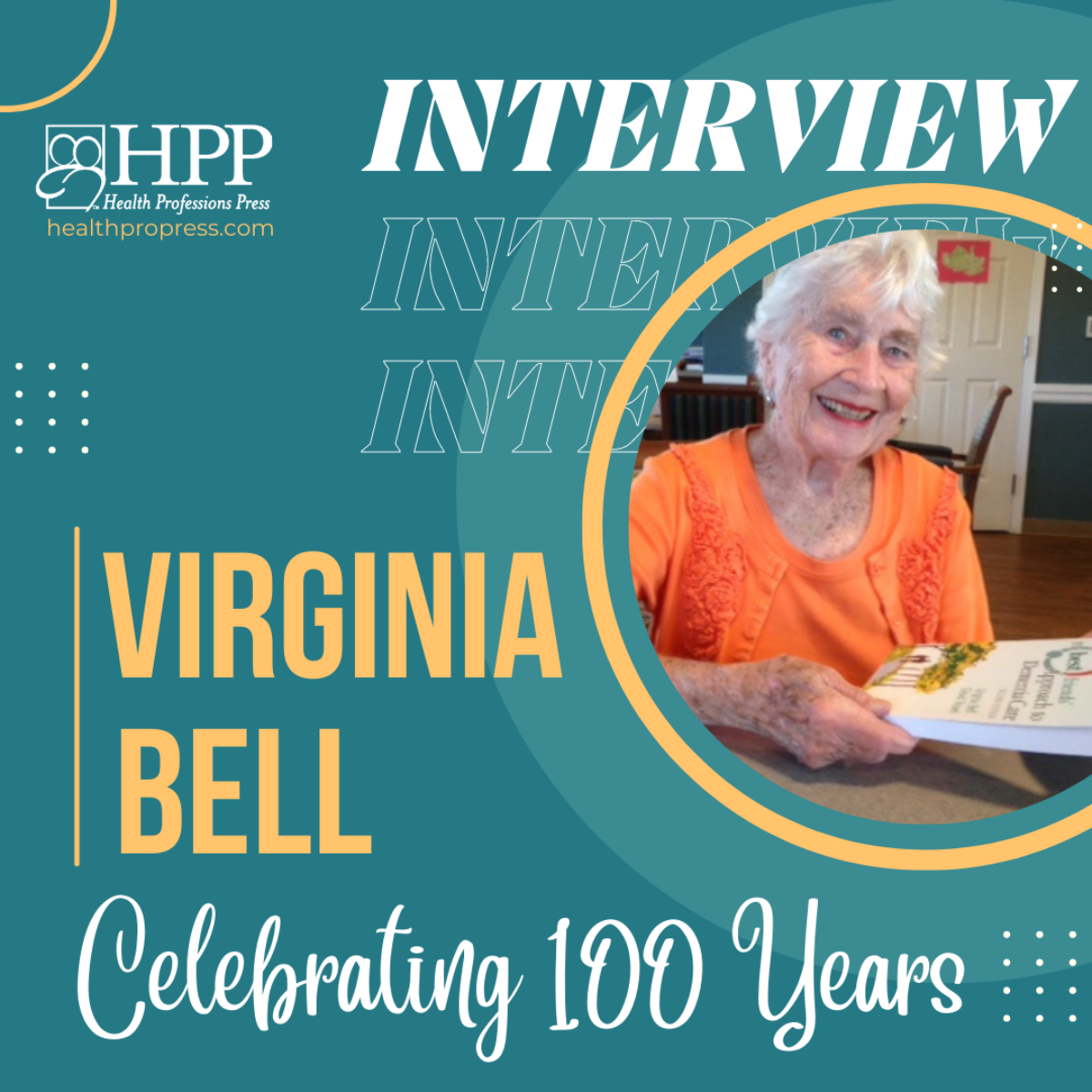
Celebrating 100 Years with Virginia Bell
June 30, 2022 marks the 100th birthday of Virginia Bell, one of the most influential thought leaders in the field of dementia care over the last four decades, who continues to this day to improve the lives of people with dementia and their caregivers. HPP sat down with the legendary author, speaker, and advocate to look back on 100 years and look forward towards the future of dementia care.
What influenced you to start your career later in life? What motivated you to choose to work in dementia care?
I received my undergraduate degree in math and chemistry but as I grew older, I volunteered with community programs and found myself moving away from the black and white nature of science to a greater interest in people, particularly the challenges faced by caregivers. As a result, I decided to study for a master’s degree in social work and did my practicum at a new program at the University of Kentucky—the Sanders Brown Center on Aging.
My practicum involved Alzheimer’s support groups. I was assigned the job of sitting with these individuals with dementia while their families attended the Alzheimer’s support group. Initially I was disappointed. I had wanted to be with the family caregivers.
That experience, however, was life-changing, as I found myself connecting with the persons with memory loss, learning ways to support their happiness, and understanding that they still wanted to have a voice. From that point on I knew I had found my calling. I graduated with my MSW at age 60 and was hired as the first social worker and family counselor at the Center assigned to support persons living with dementia and their care partners.
Where did the idea of using friendship in dementia care come from?
I started one of the first dementia-specific adult day centers in the United States back in 1984. We didn’t have much money, so we had to rely on volunteers. We wanted to create a meaningful experience for the volunteers and a rich program environment, so I proposed the idea that the volunteers would be called “best friends” and matched with one individual participant in the day center.
Almost immediately, we realized that the concept of friendship was impactful. Volunteers loved building relationships with the same person week after week, and the persons with dementia seemed to thrive in this therapeutic, social environment.
Early on, we also realized how important it was to gather life-story information about the person with dementia. The more we learned about likes and dislikes, preferences, favorite stories, achievements, and personality, the easier care became. We could weave these stories into opportunities for fun and activity, conversation, and ways to creatively address dementia-related behavior.
All these learnings came together when David Troxel joined the Center on Aging in 1986. He soon became my friend and writing partner. Along with many journal articles, we wrote The Best Friends Approach to Alzheimer’s Care which was published in 1996 (Health Professions Press). It took off and became a popular and influential book in the US and internationally. And it all started at a day center in Lexington, Kentucky!
Were some of your colleagues skeptical that this idea around friendship could work?
Absolutely. I was told by several colleagues that a social model program dependent upon volunteers would never work, but we ended up thriving and the day center is now 38 years old. David and I were particularly proud to receive a Robert Wood Johnson Foundation grant for the day center as part of their program to boost this then new service for persons with dementia and their caregivers.
This atmosphere of friendship and fun, along with meaningful conversation, music, exercise, and activity worked. Families who were struggling at home were amazed how well mom did at the day center.
The Center became a true teaching learning model. We learned, for example, that you could redirect a participant who wanted to leave by asking about her life growing up on a farm or inviting her to talk to the group about her accomplishments as a nurse. Before the day program, staff or families would argue or correct the person—a technique that rarely works.
What has been your favorite part about working with people with dementia?
It’s extraordinary when you see someone who has struggled with a diagnosis of Alzheimer’s disease experience an enjoyable day, laugh, sing, dance, and engage in meaningful conversation. Even with their forgetfulness, old memories can arise, affection can be shown, and working together as friends you can accomplish some meaningful tasks and projects.
What has been your proudest accomplishment?
The Best Friends Approach model of care has changed the face of dementia care in the U.S. and internationally. I’m particularly proud that my co-author David and I have been early proponents of the importance of human rights when it comes to our field. A piece we have written, the Dementia Bill of Rights, has influenced care internationally.
I am also proud to have taken the Best Friends approach international. I’ve spoken at 30 different countries at conferences sponsored by Alzheimer’s Disease International, a wonderful group based in London.
Dementia is a devastating disease, and many shy away from such a difficult topic. What is the most important thing you want others to know about people with dementia?
Perhaps the most important thing I’ve learned is that dementia care isn’t all that complicated. Keep the person as physically healthy as possible, and connect with him or her though empathy, communication, kindness, and meaningful engagement. When you do this, you will realize that the person is just like the rest of us, with all the same needs and emotions.
In our books, we call it having “the knack,” the art of doing difficult things with ease. Caregiving knack, including patience and flexibility, can help you enjoy a better day and reduce dementia-related behavior.
Where do you think the field of dementia care should go from here? Where is it headed?
I have never been more optimistic. Thanks to the advocates at the Alzheimer’s Association, research funding has soared to over $3.2 billion. I’m so encouraged to see diverse young people including Ph.D. candidates and medical students entering the field of dementia research.
We will soon have a better diagnostic test for Alzheimer’s disease that will help us identify the disease earlier. We will see greater focus on brain health and the importance of a healthy lifestyle.
And of course, better medicines will be here soon that may prove to be disease-modifying.
What are your plans for your 100th birthday? Are you doing anything special to celebrate?
Yes! We will celebrate my birthday at a Kentucky state park with over one hundred of my family members at our annual family reunion.
On the day of my birthday, it will be low-key. We will put up a canopy in the front yard and greet friends and neighbors.
I’ve always been active and a runner, and I’ve tried to limit my sugar intake, but I will absolutely eat cake on my 100th!

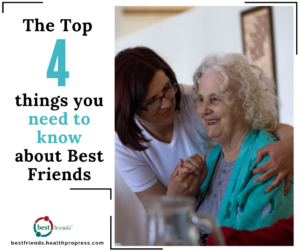
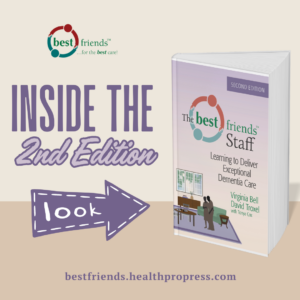
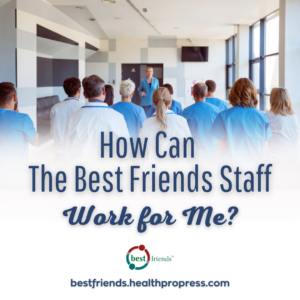
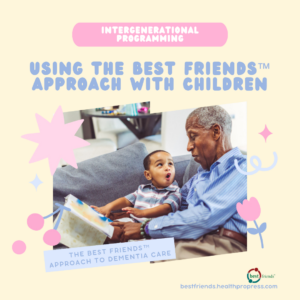
Add comment